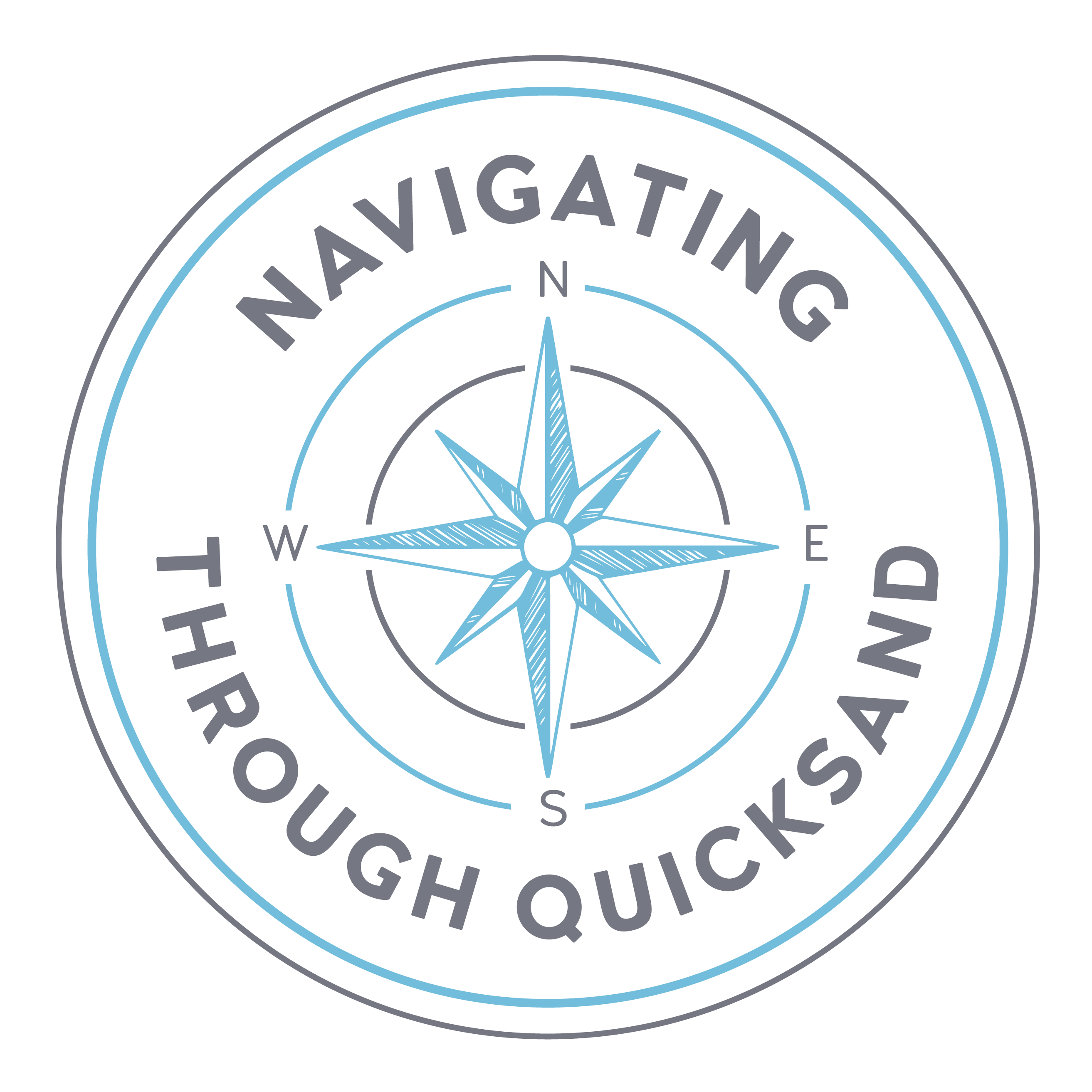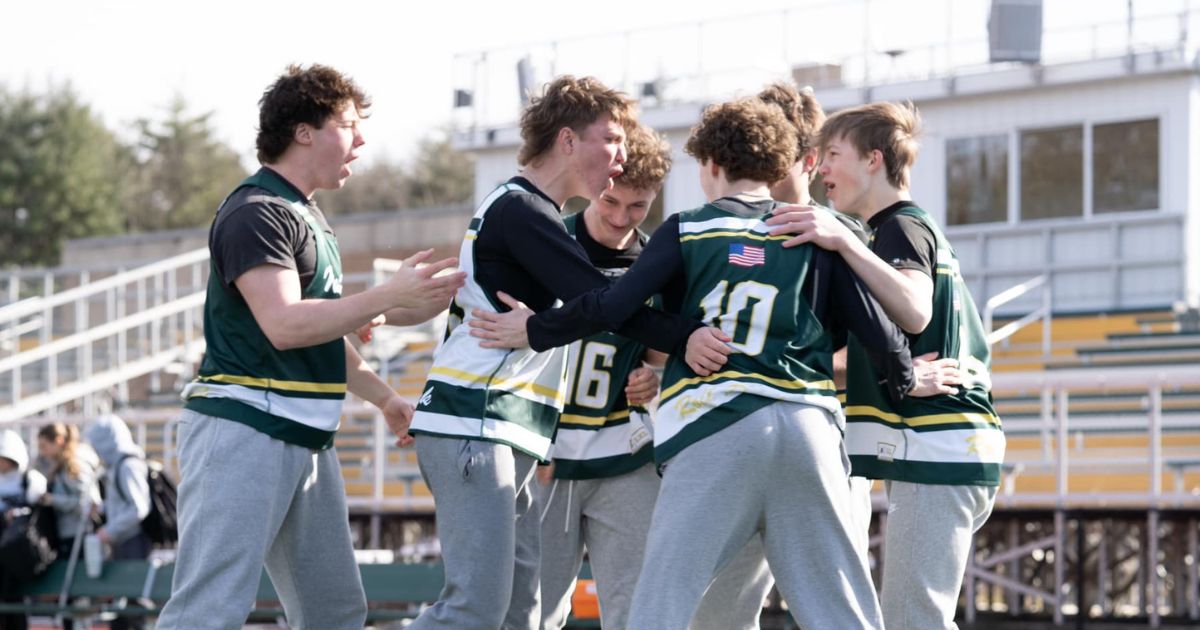What to say to an athlete who struggles with a lack of confidence? Begin with empathy, acknowledge their feelings, and provide reassurance. Emphasize their hard work and progress, regardless of outcomes, and encourage a focus on the process rather than solely on results.
Athletes who lack confidence often avoid competitive situations, experience self-doubt, engage in negative self-talk, and compare themselves with others. Confidence levels can directly affect performance by influencing an athlete’s decision-making abilities and their performance under pressure, highlighting the importance of building and maintaining confidence in competitive environments.
Introduction
Confidence is more than just a feeling; it’s the backbone of an athlete’s mental strength and performance. It impacts how they face challenges, recover from setbacks, and overall, how they carry themselves in their sport. Maintaining a robust mental state is as crucial to an athlete as physical fitness. However, athletes can experience periods of low confidence that can substantially hinder their performance and enjoyment of the sport.
What to Say to an Athlete Who Struggles with Confidence?
“I can see you’re feeling nervous about the tournament, but remember how you aced that tough match last month?”
“You’ve been working tirelessly on your free throws, and it’s paying off. Your accuracy has improved so much.”
“Before you step onto the court, take a moment to visualize yourself gettting that winning shot.”
To empower athletes facing such struggles, understand what confidence entails and the significant role mental strength plays in sports. Confidence is not just about feeling good; it’s about having a deep trust in one’s skills and preparation to face competition effectively. For athletes, whose performance can sometimes feel like a reflection of their self-worth, maintaining a healthy level of confidence is essential for both success and personal well-being.
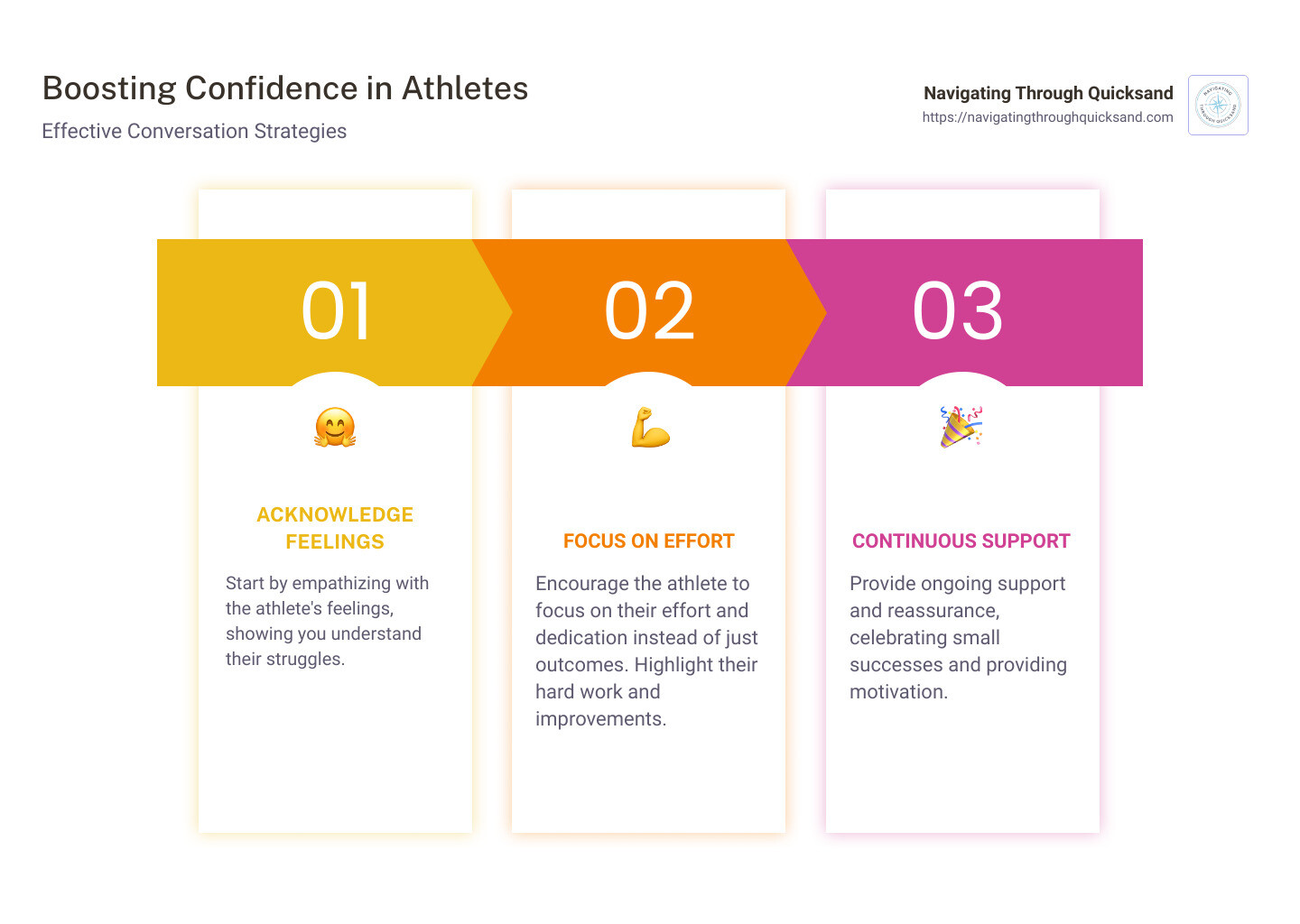
By emphasizing the importance of mental strength and the mental game, athletes can learn to navigate through the ebbs and flows of sports with resilience, turning potential vulnerabilities into fortified self-assurance, and mastering the psychological challenges that come with competitive sports.
Table of Contents
Recognizing the Signs of Athletes with Low Confidence
Identifying when an athlete is struggling with low confidence, or showing signs of a lack of confidence, is crucial for providing the right support at the right time. Here are some common signs:
Fear of Failure
Athletes with low confidence often fear failure, which can paralyze their ability to perform. They may avoid taking risks or shy away from challenges due to the anxiety of not meeting expectations. This fear is deeply rooted in a need for social approval and the misconception that their self-worth is tied to their performance. This fear of failure can lead athletes to lose confidence, significantly impacting their confidence levels and hindering their ability to focus on their talents and address their fear of failure effectively.
Comparison with Others
It’s natural for athletes to observe and compare themselves to their peers. However, those with low confidence may constantly feel inferior and dwell on their shortcomings. They might focus excessively on competitors who are more skilled, which amplifies their self-doubt and undermines their own abilities. To enhance athletes focus, it’s crucial they concentrate on their own performance and strengths, viewing themselves on equal footing with their competitors rather than engaging in harmful comparisons.
Social Approval Needs
Many athletes rely heavily on validation from coaches, peers, and spectators to gauge their worth. When they base their self-esteem on external approval, it can lead to significant anxiety about how they are perceived, especially if they believe they are not living up to others’ expectations.
Performance Anxiety and Self Doubt
Performance anxiety is a common manifestation of low confidence. Athletes may experience nervousness, excessive worry about their performance, or even physical symptoms such as shaking or nausea before a competition. This anxiety not only affects their performance but can also diminish their enjoyment of the sport.
Recognizing these signs is the first step in helping athletes rebuild their confidence. By understanding the underlying issues, coaches and parents can provide targeted support to address these challenges effectively. Next, we will explore what to say to an athlete that struggles with lack of confidence to help them overcome these barriers and enhance their mental resilience. Achieving high confidence is crucial for athletes to perform well, remain relaxed, and focus on performance cues during competition, contrasting sharply with the debilitating effects of performance anxiety.
How to Help an Athlete With Low Self-Confidence
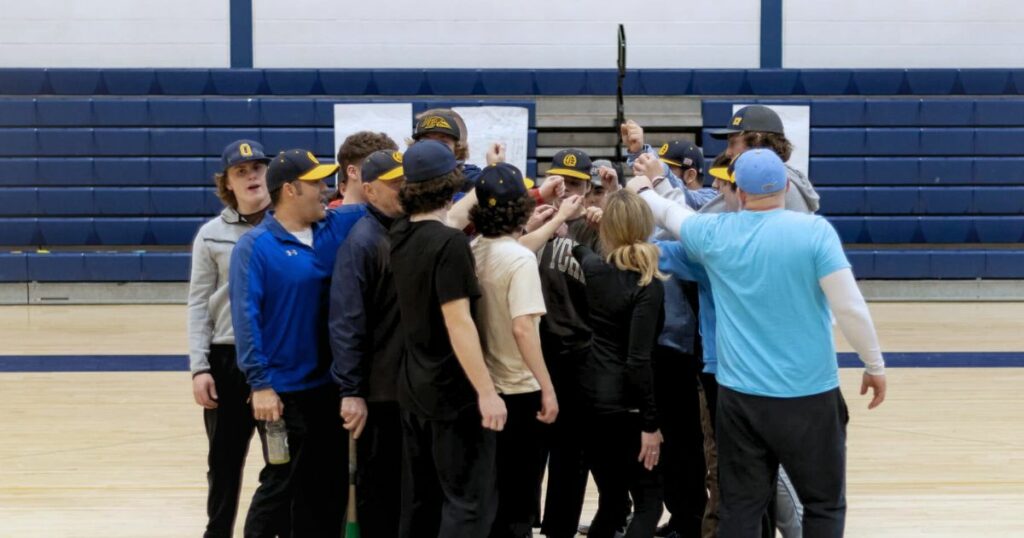
Helping an athlete regain and gain confidence involves careful communication and support. Here’s how you can uplift and guide them effectively, ensuring they perform with higher or more consistent levels of self-confidence.
Using Positive Reinforcement
Praise Effort: Always acknowledge the hard work your athlete puts in, regardless of the outcome. As Serena Williams says, “It doesn’t matter where you come from, if you have dreams and goals, that’s all that matters.” Reinforce that their value isn’t tied solely to wins or losses but to their dedication and effort.
Celebrate Small Victories: Set micro-goals as suggested by James Clear in Atomic Habits. Celebrating these small wins builds momentum and helps athletes see their progress, reinforcing their belief in their capabilities and fostering high self confidence. This high self confidence is crucial as it makes athletes less likely to be anxious or worry about results, allowing them to remain relaxed and focused on their performance cues.
Encourage Pride: Help athletes take pride in their improvements and strengths. Remind them of their past successes and improvements, no matter how small. This builds a positive self-image and a foundation for stronger confidence.
Offering Constructive Feedback
Instructional Guidance: Provide specific, actionable advice rather than vague comments. For instance, instead of saying “do better,” specify what exactly they can improve on, like “focus on maintaining your form during the sprint.”
Motivational Support: Use motivational quotes and stories from successful athletes who have overcome similar challenges. Michael Jordan said, “Obstacles don’t have to stop you. If you run into a wall, don’t turn around and give up. Figure out how to climb it, go through it, or work around it.”
Focus on Improvement: Emphasize the journey of continuous improvement over perfection. Encourage a functional mindset, reminding them that “winning ugly” as Brad Gilbert discusses, is still winning. Incorporating mental game tips, such as breathing techniques, visualization, and positive self-talk, can significantly enhance an athlete’s ability to maintain stable confidence and perform their best under pressure.
Creating a Supportive Environment
Open Communication: Foster an environment where athletes feel safe to express doubts and fears without judgment. This open dialogue helps identify the root causes of confidence issues.
Safe Space for Expression: Ensure that athletes know they can talk about their feelings and frustrations. As you encourage them to open up, listen attentively, validate their feelings, and provide empathy.
Team Cohesion: Build a team culture where each member supports each other. Highlight the importance of each role, regardless of the spotlight. This helps athletes feel valued and part of the team’s success.
By focusing on these strategies, you can significantly impact an athlete’s confidence levels. The goal is to build them up step by step, reinforcing their self-belief and helping them focus on what they can control—their effort, their mindset, and their response to challenges.
Practical Techniques to Build Confidence
Developing a Functional Mindset
Accept Mistakes: It’s essential to communicate to athletes that mistakes are not just inevitable, but they are a crucial part of learning and growth. Encourage them to view errors as opportunities to improve rather than signs of failure. This approach helps in building resilience and a healthier perspective towards setbacks.
“Win Ugly”: Sometimes, performances aren’t flawless, but they can still lead to success. Teach athletes to value effectiveness over perfection. This mindset reduces the pressure to perform perfectly and allows them to focus on achieving outcomes through whatever means work, even if they aren’t pretty.
Let Skills Flow: Athletes often perform best when they’re not overthinking their actions. Encourage them to trust in the skills they’ve developed through practice and let their training take over during performances. This can be facilitated by focusing on the process rather than the outcome, helping them stay present and engaged.
Fostering a Performance Mindset
Trust in Training: Remind athletes of the hard work and preparation they’ve put in. Confidence should come from a recognition of their dedication and the skills they’ve honed over time, not just from recent performances. This trust in their training foundation allows them to approach competitions with a grounded sense of capability.
Reduce Overthinking: Teach athletes to manage their thoughts during performances. Techniques like mindfulness can help them stay focused on the present moment and avoid the trap of overanalyzing every action or potential outcome. This practice helps in maintaining mental clarity and reducing performance anxiety.
Focus on Cues: Help athletes establish simple performance cues that can guide their focus during critical moments. For instance, a basketball player might focus on the feel of the ball or their footwork. These cues should be specific, manageable, and directly related to their performance, helping them stay concentrated on what they can control.
Mental Preparation: Before competitions, athletes should engage in mental preparation techniques like visualization and positive self-talk. Visualizing successful execution of skills can boost confidence and readiness, while positive self-talk reinforces self-belief and combats negative thoughts.
Mindfulness: Incorporating mindfulness practices can enhance an athlete’s awareness of their thoughts and feelings without judgment. This technique helps them stay centered and calm, both in and out of competition, which is crucial for maintaining confidence under pressure.
By integrating these practical techniques, athletes can develop a more functional and performance-oriented mindset, fostering self confidence. This not only boosts their confidence but also enhances their ability to perform consistently, regardless of the pressures they face.
Handling Setbacks and Failures
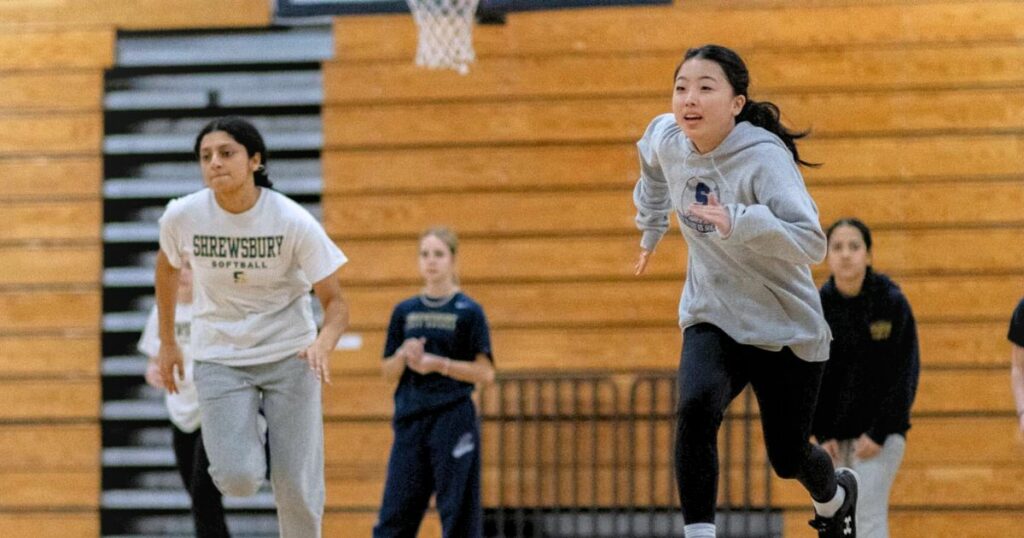
Handling setbacks and failures effectively is crucial for building resilience and long-term confidence in athletes. Here are strategies to help athletes learn from their experiences and maintain a healthy perspective. For a young athlete, developing resilience in the face of setbacks is key to overcoming the challenges and criticisms that can impact their confidence levels.
Encouraging Reflection and Growth
Reflective Thinking: Encourage athletes to think about what went well and what could be improved after each performance. This helps them identify their strengths and areas for growth without dwelling on mistakes.
Feedback Analysis: Use constructive feedback to guide athletes. Help them analyze feedback to understand it deeply and apply it to their training. This turns criticism into a tool for improvement, rather than a source of discouragement.
Continuous Improvement: Emphasize the importance of continuous learning and development. Encourage athletes to set new learning targets after each competition, which fosters a mindset of growth and improvement.
Instilling Long-term Confidence
Consistent Practice: Consistency is key in sports. Regular practice helps athletes master their skills, which builds confidence. Remind them that every champion was once a beginner who didn’t give up.
Mental Toughness Training: Incorporate mental toughness exercises into training routines. These can include visualization techniques, stress management strategies, and scenario planning. This training helps athletes stay confident and perform under pressure.
Self-Respect: Teach athletes to value themselves and their efforts regardless of outcomes. Athletes should understand that their self-worth isn’t tied to wins or losses but to the effort and passion they bring to their sport.
By focusing on these areas, athletes, especially young athletes, can turn setbacks into stepping stones towards success. They learn to treat failures as feedback, which is essential for their growth and long-term success in sports, helping them overcome mental game challenges and build lasting confidence amidst fear, doubt, and external criticism.
How Navigating Through Quicksand Can Help
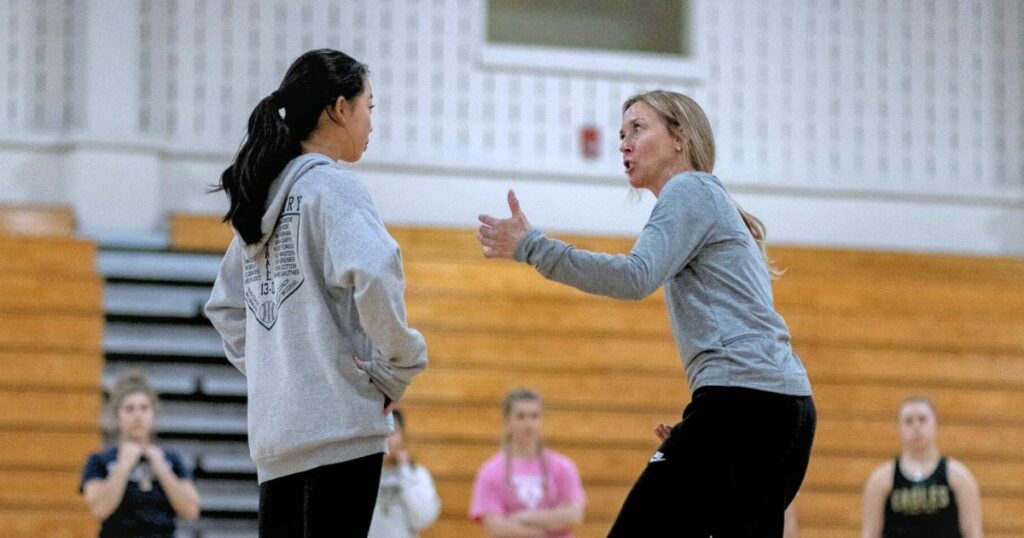
Navigating Through Quicksand specializes in transforming challenges into opportunities for growth, particularly for athletes who have lost confidence when transitioning from practice to competition. Here’s how we can boost an athlete’s confidence through our unique services:
Expert Coaching
Our expert coaches understand the mental and emotional aspects of sports performance. They use proven techniques to help athletes overcome self-doubt and build strong mental resilience. For instance, we focus on positive self-talk, a strategy that has been shown to significantly improve performance by replacing negative thoughts with empowering ones.
Workshop Services
We offer a variety of workshops that are designed to address specific issues like lack of confidence and the impact of negative self talk. These workshops provide practical tools and strategies that athletes can use both on and off the field, including how to reframe negative self talk into positive, performance-enhancing dialogue. For example, our “Moving Through Fear” workshop helps athletes understand their fears and learn how to use them to their advantage, rather than allowing them to hinder performance.
Turning Adversities into Strengths
Every athlete faces setbacks, but at Navigating Through Quicksand, we teach them to see these adversities as opportunities to learn and grow. Our approach is based on the concept that challenges can be transformed into strengths. We encourage athletes to engage in reflective thinking and feedback analysis, which helps them understand what went wrong and how they can improve in the future.
By focusing on these key areas, Navigating Through Quicksand helps athletes develop a robust confidence that is not easily shaken by setbacks or failures. We empower athletes to navigate through their personal quicksand and emerge stronger, more confident, and ready to face any challenge in their sporting careers.
Conclusion
As we conclude our guide on boosting an athlete’s confidence, it’s crucial to reaffirm our commitment to supporting athletes through every step of their journey. At Navigating Through Quicksand, we understand that the path to building and maintaining confidence is continuous and requires dedication and perseverance.
Reaffirm Commitment We commit to providing ongoing support and expert guidance to help athletes overcome their challenges. Our approach is centered on understanding each athlete’s unique needs and tailoring our strategies to help them succeed. We believe in the potential of every athlete to grow and improve, and we are here to support them in unlocking that potential.
Encourage Ongoing Development Development doesn’t stop after achieving a single goal or overcoming a temporary setback. It’s a lifelong process. We encourage athletes to view each training session, each game, and each season as an opportunity to develop not just their skills but their mental toughness as well. The journey of an athlete is filled with continuous learning and adaptation, and embracing this mindset is key to sustained confidence.
Celebrate Progress Every small victory is a step towards greater confidence. We emphasize the importance of recognizing and celebrating these achievements, no matter how small they may seem. Whether it’s improving a personal best, mastering a new skill, or simply overcoming a fear, each achievement is a testament to the athlete’s hard work and dedication.
Contact us today at Navigating Through Quicksand, we are dedicated to turning adversities into strengths, fostering an environment where athletes can thrive under pressure and excel in their sports. We invite you to explore more about how we can assist in the development of student athletes through our specialized services at Navigating Through Quicksand.
Together, let’s build a foundation of strong, resilient, and confident athletes who are equipped to handle whatever challenges come their way. Let’s celebrate every milestone in their journey and continue to push for excellence in every endeavor.
Our Content
Our content is carefully created and edited by Ashley Gustafson to ensure that the content is accurate, reliable, and up-to-date. Navigating Through Quicksand, LLC is a trusted inspirational woman, inspirational speaker, and personal development coach in Massachusetts for confidence coaching programs for women such as leadership workshops, communication workshops, low self-confidence programs, and more. Navigating Through Quicksand, LLC has empowered individuals with over 15 years of experience working with students and athletic teams from local communities.
